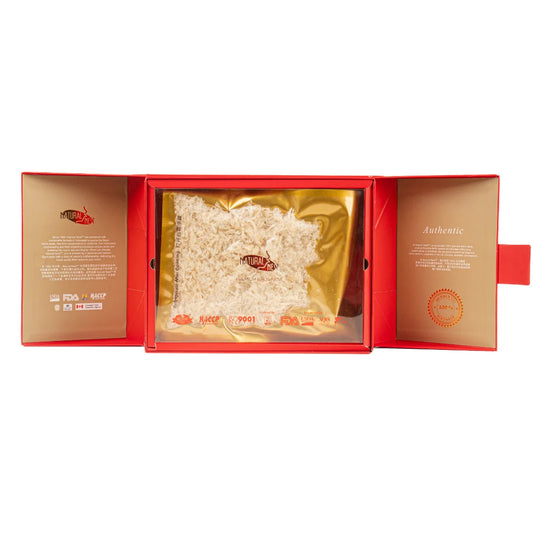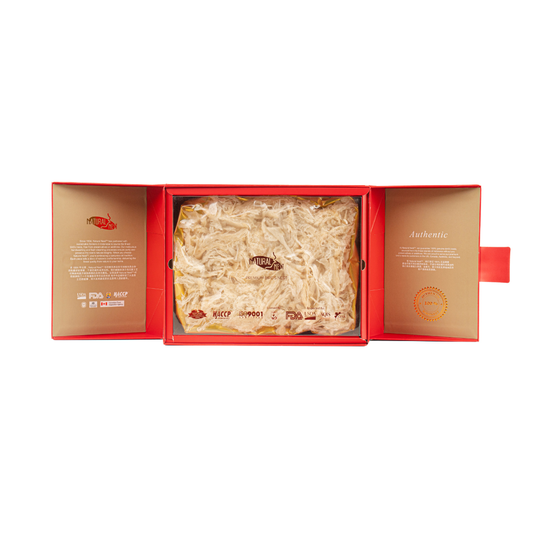For thousands of years, the Chinese people have cherished edible bird's nest soup as a prized delicacy with remarkable health benefits. Traditionally known as "燕窝" (yànwō), bird's nest soup is made from the swiftlet bird’s nest, which is composed of the bird's hardened saliva. Although the notion of consuming a bird's saliva may seem unusual to outsiders, in Chinese culture, this soup holds deep-rooted significance, particularly for its anti-aging properties and its role in supporting various aspects of health, including bone, digestive, and respiratory systems.
A Symbol of Status and Wealth
Historically, bird's nest soup was reserved for the Chinese imperial family and the elite. Considered one of the “Four Great Delicacies” in China alongside sea cucumber, shark fin, and abalone, it was often used in banquets for royalty. To this day, bird's nest soup is seen as a luxury item, valued for both its rarity and its association with longevity and health.
The swiftlet birds build their nests in caves or on cliff faces, primarily along Southeast Asian coasts, such as Malaysia, Indonesia, and Thailand. These nests are harvested by specialized collectors, making the production process both labor-intensive and highly regulated to ensure sustainability. Over the centuries, this ingredient has become an integral part of Chinese traditional medicine, revered for its ability to nourish the body from within.
Anti-Aging: A Fountain of Youth
One of the most prominent reasons edible bird's nest soup has remained popular for centuries is its reputation for promoting youthfulness and combating the signs of aging. Bird's nest is rich in proteins, glycoproteins, and epidermal growth factors (EGF), which are known to stimulate cell regeneration and repair damaged skin cells.
In Chinese tradition, bird's nest soup is consumed to maintain a youthful appearance, particularly among women seeking to reduce wrinkles and improve skin elasticity. By increasing collagen production and promoting cell turnover, the nutrients in bird's nest help restore moisture and firmness to the skin, making it one of nature's most powerful anti-aging remedies. In modern times, this has been supported by scientific studies that show bird's nest extract enhances skin health and slows down the skin's aging process.
Strengthening Bone Health
Chinese medicine holds the belief that bird's nest nourishes the body and strengthens the "Qi" or vital life force, which is essential for maintaining overall health. Its nutrient composition, including essential amino acids, calcium, and minerals, is thought to play a vital role in supporting bone health. For older individuals, consuming bird's nest soup regularly is believed to help prevent osteoporosis and maintain stronger bones, which is crucial for healthy aging.
In particular, pregnant women and the elderly in Chinese communities consume bird's nest soup to ensure the proper development of bones in infants and to reduce the risk of fractures in seniors. The emphasis on bone health through bird's nest consumption has been passed down for generations as a way to promote longevity and vitality.
Digestive Health Benefits
Edible bird's nest soup is also lauded for its ability to support the digestive system. Traditional Chinese medicine (TCM) practitioners recommend bird's nest for individuals with weak stomachs or digestive disorders. The soup is easy to digest, making it ideal for those recovering from illness, surgery, or other physical ailments.
Rich in bioactive compounds that can soothe the digestive tract, bird's nest soup has long been used to improve nutrient absorption and promote a healthy gut. Its mucin-like texture helps coat the stomach lining, reducing irritation and inflammation, which can be beneficial for individuals with ulcers or gastritis. Regular consumption is said to harmonize the spleen and stomach, ensuring smooth digestion and improving overall gut health.
Respiratory System Support
Bird's nest has long been regarded as an excellent tonic for the lungs. In TCM, it is believed to nourish the "Yin" energy in the lungs, making it an effective remedy for respiratory conditions. Chinese people have traditionally turned to bird's nest soup to help alleviate coughs, asthma, and bronchitis.
The anti-inflammatory and immunomodulatory properties of bird's nest soup can help clear mucus from the lungs, reduce coughing, and improve breathing. Consuming it regularly strengthens the lungs and respiratory system, making it a popular remedy for individuals with chronic respiratory issues, especially during the colder months when these conditions are exacerbated.
A Staple of Chinese Culinary Tradition
Although bird's nest soup is primarily revered for its medicinal qualities, it is also an important culinary element in Chinese culture. The soup itself is often prepared with rock sugar for a sweet and delicate flavor or with other ingredients such as ginseng, red dates, and goji berries for enhanced nutritional benefits. Whether served as a dessert or a savory dish, its versatility makes it a popular choice in Chinese households, especially during special occasions and family gatherings.
Beyond health benefits, bird's nest soup is also a symbol of hospitality and care. Offering this delicacy to guests reflects the host's desire to provide nourishment and good fortune, in keeping with the Chinese tradition of using food to strengthen social bonds.
A Time-Honored Tradition for Health and Longevity
The Chinese people have maintained their tradition of eating edible bird's nest soup for thousands of years, passing down both its health benefits and cultural significance from one generation to the next. Whether consumed for its anti-aging properties, bone-strengthening effects, or its ability to improve digestion and respiratory health, bird's nest soup remains an essential part of Chinese health and wellness practices.
In modern times, the health benefits of bird's nest soup have gained recognition beyond China, with scientists studying its bioactive components and nutritional value. As a result, this ancient delicacy continues to grow in popularity worldwide, making its way into wellness routines for those looking to tap into the age-old wisdom of Chinese medicine.
Ultimately, the enduring appeal of bird's nest soup lies in its harmonious blend of tradition, culture, and scientifically-backed health benefits, ensuring that it remains a cherished dish in China and beyond for generations to come.












